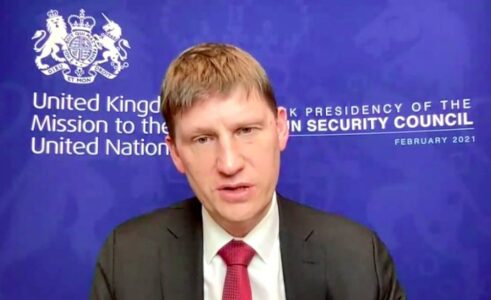
UK authorities warn for continued Islamic State threat in Iraq and Syria
UK Ambassador Jonathan Allen on Wednesday has warned the UN Security Council of the continued threat by Islamic State in Iraq and Syria, adding that despite its loss of territory, the group remains able to carry out deadly attacks in both countries.
“As the [UN] Secretary-General’s report underscores, Daesh [ISIS] continues to pose a global threat. Despite territorial losses, the group remains able to inflict deadly harm in Syria and Iraq,” he said during a Security Council briefing on Wednesday.
The latest report of the Secretary-General cautioned that the threat ISIS poses has increased during the COVID-19 pandemic and “may rise further in the coming months, in conflict zones,” emboldening the extremist group’s regional affiliates. ISIS claims affiliates around the world, including in the Sahel region of Africa and southeast Asia.
The pandemic could also lead to “form of inspired attacks [in non-conflict zones] as a result of a surge in online propaganda during the pandemic,” according to the report published on Jan. 27.
The report also warned that ISIS “could regain the capacity to orchestrate international attacks over the coming year.”
Senior Kurdistan Region officials and the Ministry of Peshmerga have routinely warned of the ongoing and significant threat of Islamic State militants operating with impunity in Iraq’s disputed territories, where a security vacuum exists in areas outside the control of either Peshmerga or federal Iraqi military forces.
The same UN report also expressed concerns that extremism could be incubated in displacement camps and detention facilities in northeast Syria.
According to the UN, the Syrian Democratic Forces (SDF) still hold around 11,000 male ISIS fighters in northeast Syria,
Moreover, the SDF-linked Internal Security Forces have to maintain security in overcrowded camps and facilities and guard thousands of ISIS families. One such camp, al-Hol, where 65,000 people remain, has seen a reject uptick in violence and assassinations.
UN human rights experts on Monday urged the 57 states whose nationals are held in northeast Syria to repatriate them.
“We are concerned particularly by the IDP [internally displaced persons] camps highlighted by the Secretary-General’s report,” UK Ambassador Allen said.
However, he conceded that “the United Kingdom facilitates the return of unaccompanied or orphaned children on a case-by-case basis and subject to national security concerns.”
The UK has so far repatriated a handful of orphaned children, including a 4-year old British girl in September last year.
Allen said, “those who have fought for or supported Daesh should face justice for their crimes in the most appropriate jurisdiction – often where those crimes were committed.”
The Kurdish-led Autonomous Administration of North and East Syria (AANES) and the SDF have previously called for the establishment of an international court in northeast Syria, but have found limited support. There is, however, more support for Iraq sentencing ISIS fighters on the condition that they are not put to death.
The British diplomat also added that the UK “remains an active member of the Global Coalition against Daesh. We co-lead coalition efforts to tackle the propaganda threat.”
The UK Royal Air Force continues to attack ISIS targets and supports the work of Iraqi forces against the terrorist group.
The British diplomat said the “United Kingdom will continue to advocate for increasing focus on preventing terrorists’ misuse of the internet and aviation security, as well as emerging threats beyond Daesh like right-wing terrorism.”
A recent US Pentagon Inspector General report covering the last quarter of 2020 said that “ISIS remained a cohesive organization, operating as a low-level insurgency in Iraq and Syria.”
In the report, Acting Inspector General US Department of Defense Sean W. O’Donnell wrote that partner forces in Iraq and Syria are able to prevent ISIS from resurging, but “unable to degrade ISIS further to the point that it no longer poses a threat.”
“The Coalition and its partners, including the Iraqi Security Forces (ISF) and the Syrian Democratic Forces (SDF), continued to contain ISIS, which operated as a low-level insurgency in Iraq and Syria. ISIS was largely unable to seize territory, execute complex attacks, or direct external attacks,” he concluded.
Source: Kurdistan 24





